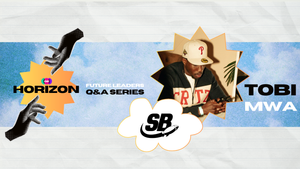As part of our Horizon Future Leaders series of interviews, we are connecting with the music industry’s next generation of leaders to gather candid advice and insights into their career journeys.
This week we caught up with Tobi Mwa, Manager and Business Partner for UK artist Nippa, and a figure shaping what modern artist development looks like in a global, digital-first music landscape.
From self-funding early projects and securing his first distribution deal at just nineteen, to now steering Nippa’s career and releases through The Orchard, Tobi has built his path by betting on talent, making smart, strategic decisions and learning every step of the way.
His experience spans management, partnerships, distribution and navigating the ever-evolving digital space where algorithms and audiences move fast.
For Tobi, ownership, adaptability and proactivity are essential. His advice for newcomers? Don’t wait for opportunities to come to you, create them. Back the talent you believe in, think like an investor and never underestimate the power of building direct-to-fan relationships.
👇 Keep reading for Tobi’s reflections on resilience, creating opportunities and why global thinking is no longer optional in the music industry.
What’s your current role in the music industry?
I’m the Manager and Business Partner for the artist Nippa.
What does your general day to day look like?
My days vary, but they always involve constant communication with my team and partners, making decisions, coordinating tasks and ensuring we all execute our tasks effectively.
What steps did you take early in your career to gain experience and build skills to get you where you are now?
I threw myself in the deep end and invested my own money in the talent I worked with before they were known. Every success validated what I already believed we could achieve and it taught me to manage budgets firsthand.
Being personally invested forced me to think carefully about generating profit. Even now, when we receive funding from partners, I approach it with the mindset of someone who has spent their own money, which helps me make strategic and responsible decisions.
What opportunities did you explore early on that were particularly valuable?
Securing a deal with ADA for the first artist I managed at nineteen was especially valuable, as it gave me early hands-on experience working with a distributor.
That foundation prepared me for later opportunities, most notably securing Nippa’s distribution deal with The Orchard, where we’ve successfully released his music for the past three years.
Has the opportunity landscape changed since then?
Yes, definitely. Back then, TikTok wasn’t as prominent, so many artists relied heavily on Instagram pages and music video channels on YouTube for exposure. Now, artists have much more control over their reach, your audience is in your own hands, and there are virtually no limits to who you can connect with.
Are there any specific internships, projects, or initiatives that you would recommend to newcomers looking to pursue a similar role?
I didn’t take advantage of internships early in my career and, from what I know, they can be quite competitive. I believe you shouldn’t rely on anything but yourself to start your pursuit.
If there’s talent around you, begin by helping them however you can. If not, seek out talent and offer your support. By actively doing the work, you create your own opportunities and increase your chances of being noticed.
What advice do you have for building and leveraging a professional network in the music industry?
Don’t hesitate to reach out to people, be proactive, but always respectful of people’s time. Be direct and concise about what you’re asking, and also think about how you can provide value in return. You’ll be surprised at who might be willing to make time for you.
How has the evolving digital landscape impacted your role, and where do you focus to stay ahead?
Social media has made audiences more global than ever, so rather than focusing on one territory at a time, it’s crucial to find the right partners to reach audiences in other regions as early as possible.
With most platforms driven by algorithms, maintaining consistency and producing marketable content is key to increasing engagement and exposure.
What trends or changes do you see on the horizon for the music industry, and how can early career professionals prepare for them?
The industry is increasingly driven by digital platforms, data and direct-to-fan engagement. Short-form content, global audiences and algorithmic discovery are only going to grow in importance.
Early career professionals can prepare by building strong digital marketing skills, understanding analytics, and learning how to identify and nurture talent in a rapidly evolving landscape. Staying adaptable and proactive in creating opportunities will be key.
What’s one piece of advice you wish someone had given you at the start of your career?
Don’t underestimate the power of mailing lists and direct-to-fan marketing. From the very beginning, take every opportunity to build and leverage that audience data, it becomes one of your most valuable tools.

